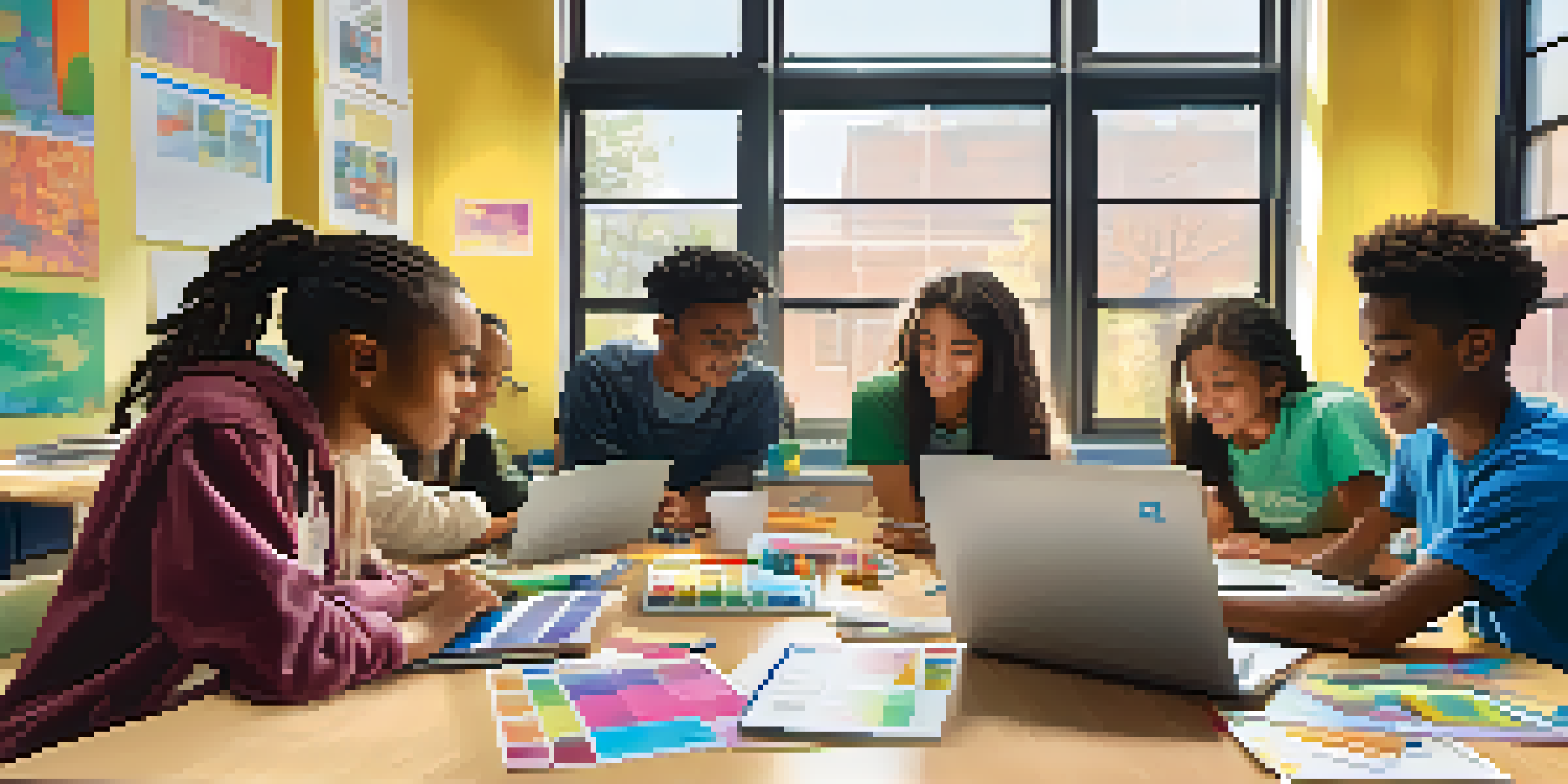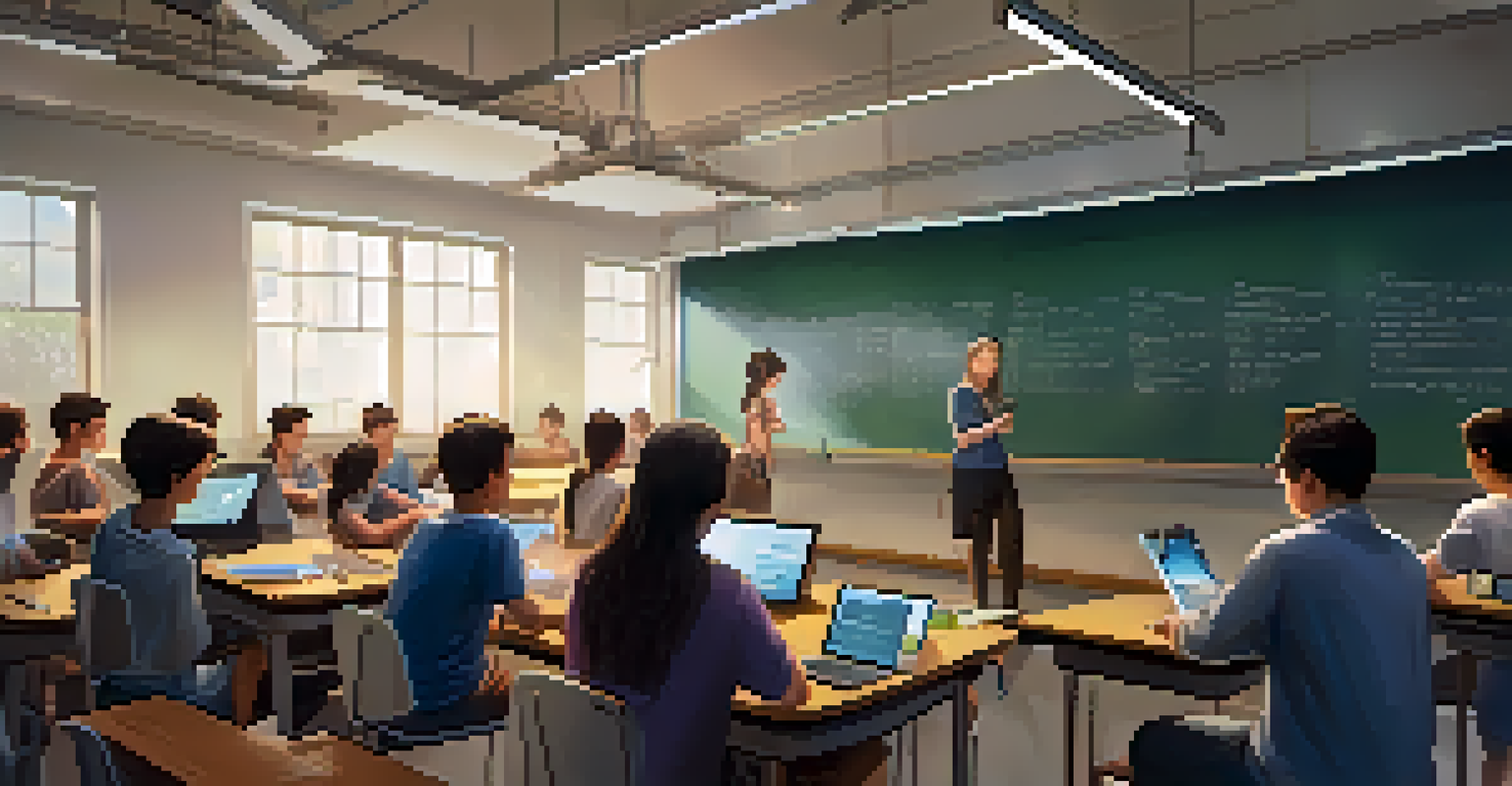Digital Literacy for Students: Essential Skills for Learning

Understanding Digital Literacy: What It Means for Students
Digital literacy encompasses a range of skills that allow students to navigate online environments effectively. It goes beyond just knowing how to use technology; it involves critical thinking and the ability to discern credible information. In today’s digital world, being digitally literate means having the capability to communicate, collaborate, and create using digital tools.
In today's world, digital literacy is not an option; it is a requirement for success.
For students, this skill set is vital not only for academic success but also for future careers. Employers increasingly seek individuals who can adapt to new technologies and utilize them to solve problems. Thus, understanding digital literacy is not just an academic requirement; it’s a life skill that will serve them in various aspects of their lives.
As education shifts more towards technology integration, embracing digital literacy can enhance a student’s learning experience. By engaging with digital tools, students can explore subjects in depth and connect with peers and experts worldwide, making learning more interactive and enriching.
Essential Skills: Navigating the Digital Landscape
One of the foundational skills in digital literacy is the ability to navigate the internet effectively. This includes knowing how to search for information, evaluate sources, and use online databases. For instance, when tasked with a research project, a student should be able to discern whether a website is credible or just a random blog post.

Another critical skill involves understanding basic online safety. Students must learn about protecting their personal information and recognizing phishing scams. Just as they wouldn’t share their home address with strangers, they should apply the same caution online to safeguard their digital identities.
Importance of Digital Literacy
Digital literacy is essential for students, equipping them with skills necessary for academic success and future careers.
Finally, being proficient in digital communication is key. This means knowing how to write emails, engage in online discussions, and use collaboration tools. Mastering these skills can help students articulate their ideas clearly and work effectively with others, even when they’re not in the same physical space.
Critical Thinking: Evaluating Sources and Content
In a world overflowing with information, critical thinking is a non-negotiable skill for students. It involves analyzing and evaluating the reliability of information they come across online. For example, when researching a topic, students should ask questions like, 'Who authored this article?' and 'Is the information backed by evidence?'
The ability to evaluate information critically is essential for navigating the complexities of the digital age.
This skill also extends to understanding bias and perspective in digital content. Recognizing that not all sources present objective truths helps students develop a more rounded view of any given topic. They can learn to appreciate diverse perspectives while also honing their ability to argue their own points effectively.
Additionally, students should be encouraged to cross-reference information from multiple sources. By doing so, they can confirm facts and reduce the risk of spreading misinformation. This practice not only enhances their learning but also fosters a culture of informed digital citizenship.
Collaboration Tools: Working with Others Online
As education becomes more collaborative, knowing how to use digital tools for teamwork is essential. Platforms like Google Docs and Microsoft Teams allow students to work together in real time, regardless of where they are located. This capability mirrors the collaborative nature of the modern workplace, preparing them for future endeavors.
Moreover, understanding how to communicate effectively in these environments is crucial. Students must learn to articulate their ideas clearly and provide constructive feedback to their peers. This not only improves their own communication skills but also fosters a team-oriented mindset.
Critical Thinking in Research
Students must develop critical thinking skills to evaluate online information and discern credible sources.
Finally, students should be taught to manage their time and responsibilities when collaborating online. Setting deadlines, dividing tasks, and holding each other accountable are all important aspects of successful teamwork that will serve them well in academics and their future careers.
Digital Creativity: Producing and Sharing Content
Digital literacy also encompasses the ability to create and share content. This could range from writing blog posts to creating videos or infographics. By engaging in these activities, students can express their ideas and showcase their talents in unique ways.
Encouraging creativity in the digital realm empowers students to think outside the box. For example, a student might create a video presentation for a class project instead of a traditional poster. This not only makes the project more engaging but also helps them develop valuable skills in digital storytelling.
Additionally, sharing their work online can provide students with feedback and recognition. Platforms such as social media or educational blogs offer opportunities for them to connect with a broader audience. This interaction can motivate students to refine their skills and broaden their perspectives.
Ethics in the Digital World: Understanding Responsibility
As students become more active participants in the digital space, understanding ethics is paramount. They need to grasp the importance of respecting copyright and intellectual property. This means knowing when it’s acceptable to use someone else's work and how to give proper credit.
Moreover, students should be aware of the impact of their online behavior. Cyberbullying and online harassment are serious issues that can have lasting effects. By instilling a sense of responsibility, students can learn to navigate online spaces with empathy and respect.
Ethics and Responsibility Online
Understanding digital ethics is crucial for students to navigate online spaces responsibly and with respect for others.
Additionally, discussions around privacy and consent are essential. Students must understand what it means to share information online and the potential consequences of their digital footprints. This awareness will help them make informed decisions about their online presence.
Continuous Learning: Adapting to New Technologies
Digital literacy is not a one-time achievement but a continuous journey. As technology evolves, so too must students’ skills. They need to embrace a mindset of lifelong learning, always seeking to improve their digital capabilities and adapt to new tools.
For instance, a student who learns to use one software program may find it helpful to explore similar applications. This not only broadens their skill set but also enhances their adaptability—an essential trait in today’s fast-paced world. Being open to learning new technologies can make a difference in both academic and professional settings.

Encouraging curiosity and exploration can foster this culture of continuous learning. Schools can promote tech workshops or coding clubs that allow students to experiment with new tools. By creating an environment that values learning, students will feel empowered to take charge of their digital literacy journey.